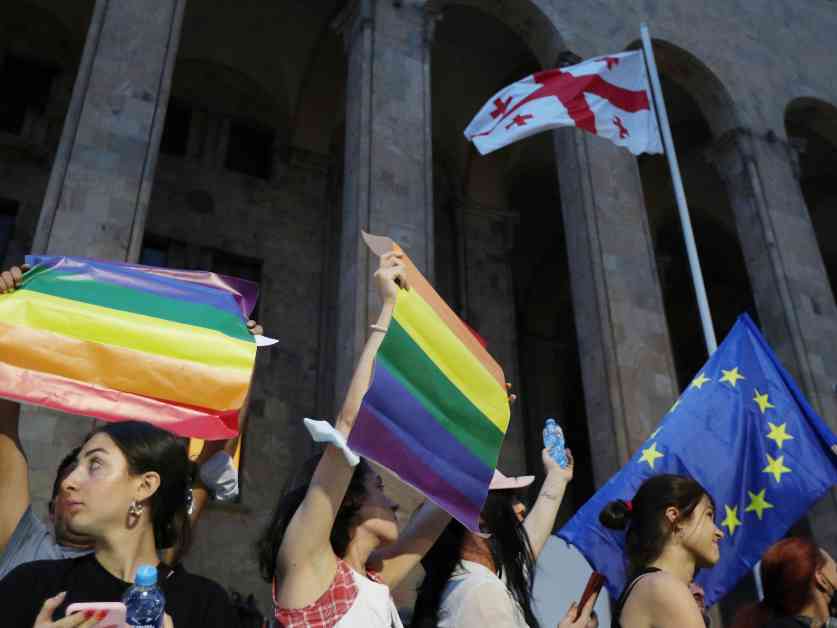Georgia’s LGBTQ Rights Legislation: Parliament Passes Controversial Law Despite Opposition
In a move that has sparked outrage from various groups, Georgian politicians have approved a new law on “family values and the protection of minors” that severely restricts LGBTQ rights in the country. The bill, which was passed in its third and final reading, has been heavily criticized by the president, rights organizations, and the European Union.
The legislation, which was adopted on Tuesday, includes provisions that would allow authorities to ban Pride events and the display of the LGBTQ rainbow flag in public. It also gives the government the power to censor films and books that are deemed to promote LGBTQ rights. Additionally, the law prohibits gender transition, adoption by gay and transgender individuals, and invalidates same-sex marriages conducted outside of Georgia.
The ruling Georgian Dream party, which has a majority in parliament, voted 84 to 0 in favor of the bill, despite opposition lawmakers boycotting the vote. Party leaders argue that the law is necessary to uphold “traditional moral standards” in Georgia, where the Orthodox Church wields significant influence.
Tamara Jakeli, the director of Tbilisi Pride, expressed deep concern over the implications of the law on the LGBTQ community in Georgia. She stated, “This law is the most terrible thing to happen to the LGBT community in Georgia. We will most likely have to shut down. There is no way for us to continue functioning.”
Georgian President Salome Zourabichvili, while largely a ceremonial figure, has voiced her disapproval of the bill and indicated that she may veto it. However, Georgian Dream and its allies have enough support in parliament to override any potential veto.
LGBTQ rights have long been a contentious issue in Georgia, with polls showing widespread disapproval of same-sex relationships and the constitution explicitly prohibiting same-sex marriage. Participants in Tbilisi’s Pride marches have faced physical attacks from anti-LGBTQ protesters in recent years, highlighting the hostile environment faced by the LGBTQ community in the country.
The upcoming October 26 election has further intensified the debate on LGBTQ rights, with Georgian Dream campaigning aggressively against such rights as it seeks a fourth term in office. The party, led by billionaire and former Prime Minister Bidzina Ivanishvili, has strengthened ties with Russia while facing strained relations with Western countries.
Earlier this year, Georgian Dream passed a controversial law on “foreign agents” that drew criticism from European and American critics who viewed it as authoritarian and influenced by Russia. The law led to significant protests in Georgia, signaling growing dissatisfaction with the ruling party’s policies.
Despite its shifting stance on LGBTQ rights – having initially passed anti-discrimination laws in 2014 before adopting more conservative positions – Georgian Dream remains popular in Georgia. However, its support has waned since 2020, when it narrowly secured a majority in parliament.
The European Union has expressed grave concerns over the passage of the bill, warning that it could have significant implications for Georgia’s European integration process. The EU has urged Georgian authorities to reaffirm their commitment to the path of EU integration and address the issues raised by the new legislation.
As Georgia grapples with the impact of the restrictive LGBTQ rights law, the future of the country’s relationship with the EU and the broader implications for human rights and democracy remain uncertain. The passing of this legislation marks a significant setback for LGBTQ rights in Georgia and raises questions about the country’s commitment to upholding fundamental freedoms and equality for all its citizens.



























